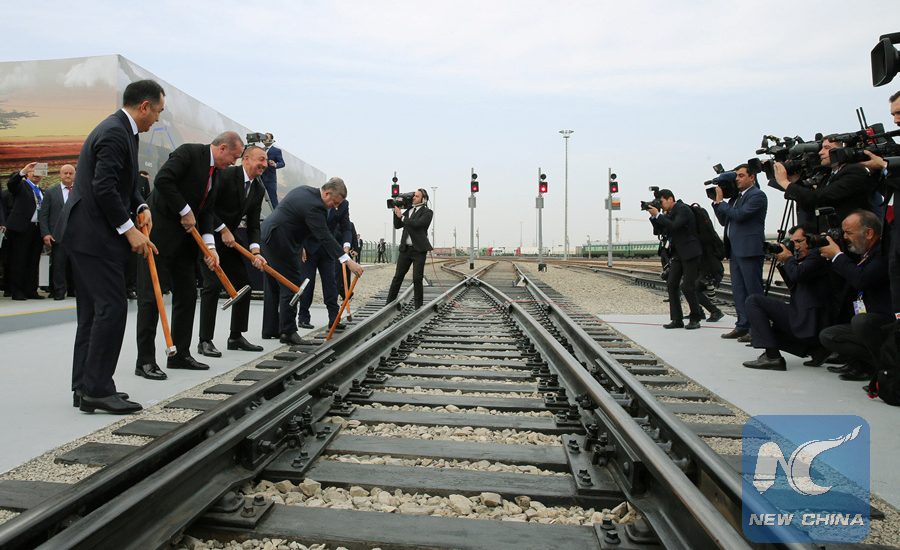- 21 December, 2017
- Foreign Policy

After consolidating land connection with Turkey through the Kars-Akhalkalak-Baku railway (it is also known as Baku-Tbilisi-Kars railway, hereinafter referred to as BTK), Azerbaijan is trying to develop transport communication, and trade and economic cooperation with neighboring countries in other formats as well, at the same time ensuring that Armenia’s economic blockade and isolation in the region is further deepened through all these projects.
In general, there are several important regional and global projects of transport corridor construction and economic cooperation, particularly BTK, North-South Transport Corridor project, Persian Gulf-Black Sea Transport Corridor project (the main proponent of which is Iran), the “One Belt One Road” large-scale economic program initiated by China and commonly referred to as the “New Silk Road”. Not only are these projects and ideas related to each other, but they also directly affect Armenia’s economic and security environment. Hence, in order to understand the general situation better, we will address a few of these projects separately.
Baku-Tbilisi-Kars
The official opening ceremony of Baku-Tbilisi-Kars railway took place in Baku on October 30, 2017 with the participation of the presidents of Azerbaijan and Turkey, prime ministers of Georgia, Kazakhstan and Uzbekistan. The idea of constructing an 826 km long railway was first proposed in 1993 when due to deterioration of Armenian-Turkish relations and closure of the border, Kars-Gyumri-Tbilisi railway ceased the operation. The idea consisted in making the new railway between Turkey, Georgia and Azerbaijan the alternative of Kars-Gyumri-Baku railway. The presidents of Azerbaijan, Georgia and Turkey raised the railway construction issue again in May 2005 during the official opening ceremony of Baku-Tbilisi_Ceyhan oil pipeline.
In November 2007, president of Azerbaijan Ilham Aliev, president of Georgia Mikhail Saakashvili and president of Turkey Abdullah Gul announced about the start of the project in Tbilisi. The construction of the railway started in July 2008 from Kars city. Initially the project was estimated at 422 million USD, then the sum reached 600 million. It was equally financed by Azerbaijan (which provided a loan to Georgia) and Turkey. The European Union and the United States refused to fund or support the implementation of this project, stating that it is designed to bypass Armenia. The West supported the reopening of Kars-Gyumri-Tbilisi railway, and the international initiative of normalization of Armenian-Turkish relations in 2008 was aimed at the latter.
The Economic Potential of BTK
It goes without saying that the initiators of BTK should strive to make the project part of a larger one in order to make it more efficient. On the day of launching the railway, the president of Turkey announced that with the railway inauguration they are announcing about the creation of direct communication from London to China. Erdogan said that currently goods transportation from China to European countries through North and South corridors takes 45-62 days, while the Baku-Tbilisi-Kars railway operation will reduce the number to 12-15 days.
Note that on October 23, 2017, the first freight train from Kazakhstan’s Kokshetau city arrived in Turkish Mersin after about 10 days by BTK route, overcoming a 5435 km distance. The participant countries hope that the railway will annually transport 17 million tons of cargo and up to one million passengers, and will become one of the essential components of the “new silk road” extending from China to Europe. However, the perspectives of efficiency of the BTK and the railway becoming one of the most important elements of the Chinese “silk road” are not that obvious.
Iran and North-South Project
Iran’s Minister of Roads and Urban Development Abbas Ahmad Akhoundi stated in the interview to Azerbaijan’s “APA” agency that Iran suggests that BTK railway reaches Tabriz. He noted that they had discussions on the issue with the Turkish side, and a respective memorandum was signed. This perspective is noteworthy for us for the simple reason that in the context of its anti-Armenian policy, Azerbaijan is trying to involve the Iranian side in the project undertaken with its Turkish ally, by further consolidating Armenia’s isolation from the regional economic processes.
Nevertheless, Iran has a different approach to the issue. When talking about the idea of economic connection of the Persian Gulf and Black Sea regions, Iranian officials have constantly noted that all the parties, namely, Azerbaijan, Armenia and Georgia should participate in the project. During the official visit of Armenia’s prime minister to Iran, the vice president of the Islamic Republic Eshaq Jahangiri announced that Armenia can be one of the transport corridors from Persian Gulf to the Black Sea. And Armenia is implementing the “North-South Road Corridor Investment Program” within the framework of this idea. However, its implementation process is going too slow. It is envisaged to finish the construction of Meghri-Yerevan-Bavra road with the total length of 556 km in 2019. But so far only a very small part of it has been constructed.
Qazvin-Rasht-Astara
The issue of establishing a railway connection between Iran and Azerbaijan is being discussed not only in the context of Iran’s possible participation in BTK, but also in the context of Russia-Azerbaijan-Iran cooperation. Tehran and Baku have long been planning to connect the south of Azerbaijan to the north of Iran through construction of the railway.
The implementation of this railway program is planned within the framework of North-South Transport Corridor construction. Russia, Iran, and Azerbaijan signed a respective agreement in 2005. And on November 1 2017, the meeting of the presidents of these three countries was held in Tehran, and one of the main issues discussed was the implementation of the “North-South” transport project connecting Baltics with India. And, apparently, the meeting of the Presidents has had a considerable impact on recent statements on Iran-Azerbaijan railway construction.
But the problem is that, despite these statements, there are no active practical steps yet. Iranian President Hassan Rouhani stated during the meeting with Azerbaijani president in February last year that there would be significant progress in this direction by the end of the year. After reelection in May of this year, Rouhani said that the railway project with Azerbaijan will be implemented during the activity of Iran’s 12th Government, adding that railway construction from Azerbaijan’s southern Astara to the Astara city of Iran’s border Ghilan region is in process, and as for bringing the railway to Rasht, a related agreement is envisaged to be signed, after which Azerbaijan will participate in the development of the project.
The Failed Iran-Armenia Railway Project
Armenia also wished to establish a railway connection with neighboring Iran. However, the plan of Iran-Armenia railway construction has not overcome the level of discussions during the last 9 years. And for obvious reasons, it is not possible to operate the railway passing through the territory of Nakhichevan yet. In October 2008, President of Armenia Serzh Sargsyan announced that “during the coming months, the construction of Armenia-Iran railway will start”. The ambassador of Iran to Armenia addressed the issue, noting that specialists from Iran are coming to Armenia in order to study the project. The prospect of China financing the Iran-Armenia railway construction has also been discussed on the theoretical level. Ambassador of China to Armenia has announced that Chinese companies are studying the possibility of financing the Iran-Armenia railway.
However, there is no progress in the implementation of the project yet. Moreover, in January 2017, the RA Government made a decision to dissolve the “Railway Construction Directorate” established in 2009 for the purpose of Armenia-Iran railway construction. Besides, the construction of Iran-Azerbaijan railway undermines the Iran-Armenia railway since the former will already ensure Iran’s connection to Georgia and the Black Sea, as well as Azerbaijan, Russia and the Baltic Sea.
However, official Yerevan does not give up the idea of constructing a railway to Iran. On November 9, 2017, the RA Ministry of Transport, Communication and Information Technologies spread a statement informing that the railway construction concession manager company “Rasia FZE” has violated the agreements, terms, and, thus, Armenia is going to build the railway irrespective of that company.
Aram Sargsyan
“Union of Informed Citizens”




